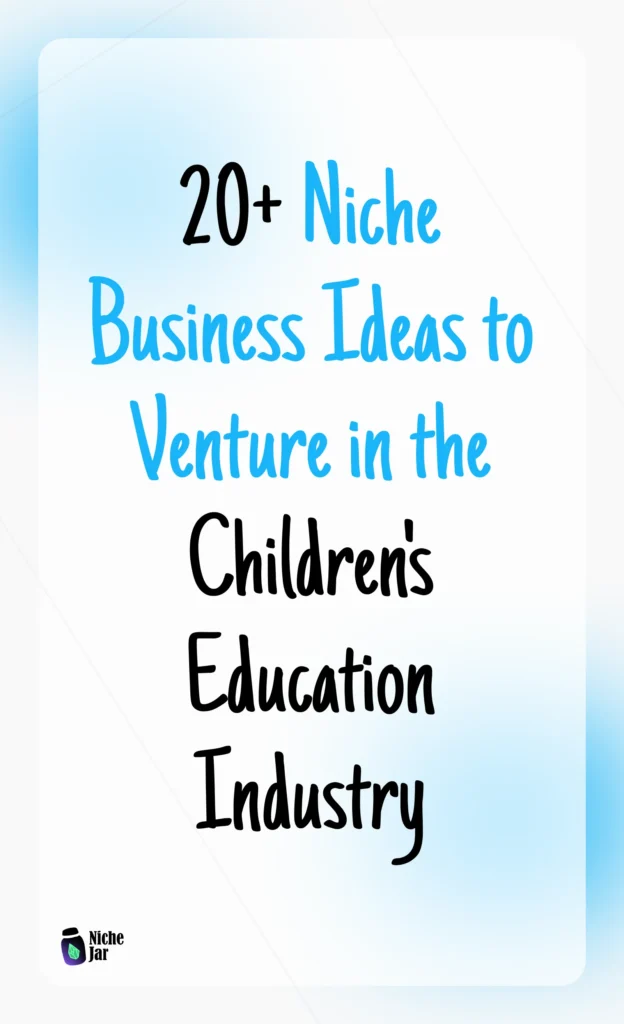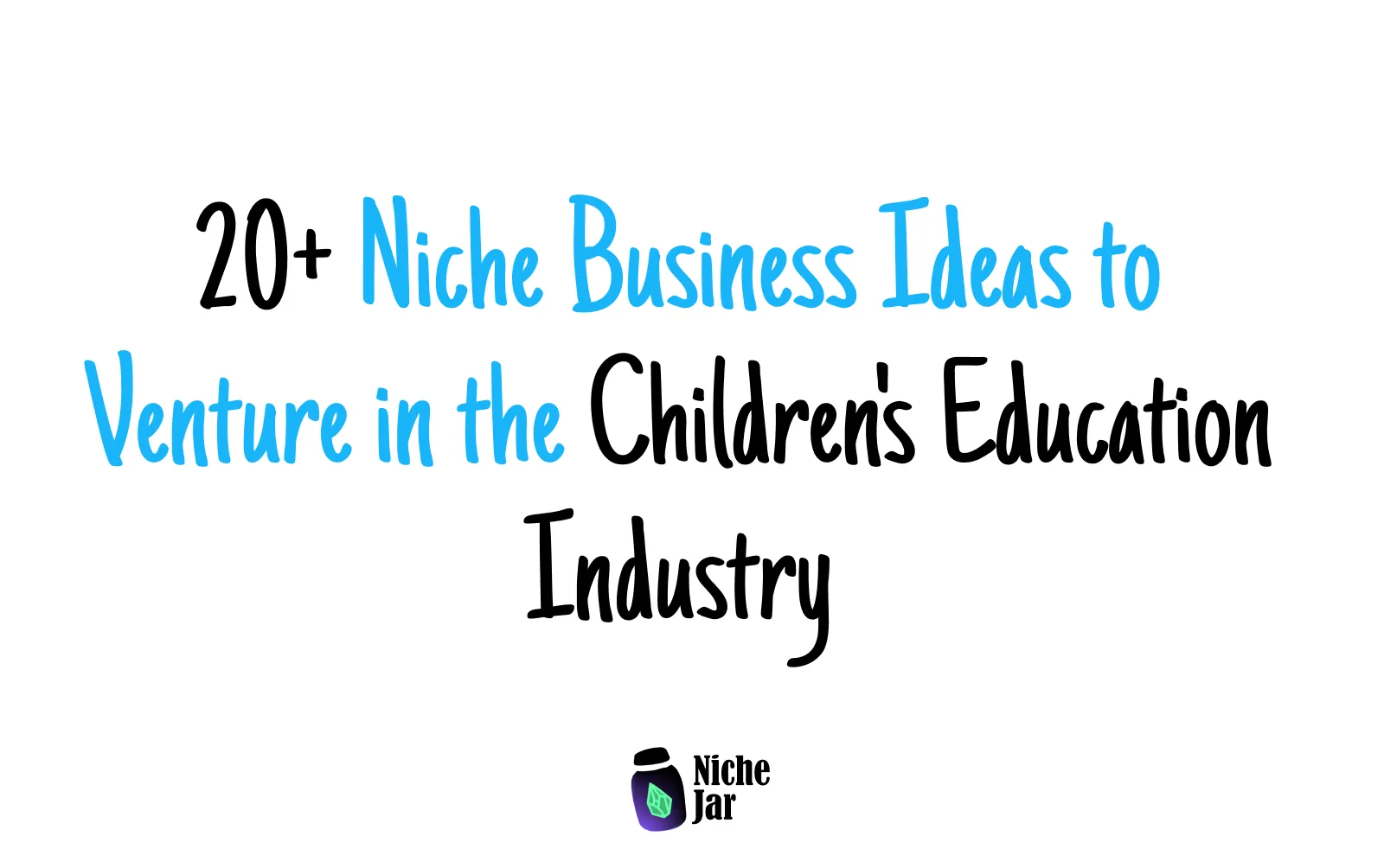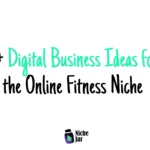- Senia
- 0 Comments
- 1252 Views
Have you ever thought about turning your passion for teaching or children’s development into a sustainable business? From what I’ve seen, the children’s education industry offers a wealth of opportunities for everyday people to create meaningful, profitable ventures. If you’re curious about 20+ Niche Business Ideas to Venture in the Children’s Education Industry, this guide might give you some practical inspiration.
The children’s education sector has grown steadily over the years, fueled by parents’ desire to give their kids a head start in life. From early childhood development to extracurricular enrichment, there’s a rising demand for creative, effective, and accessible educational solutions. This makes it a promising area for anyone looking to start a business with both purpose and profit potential.
From what I’ve observed, the beauty of this niche is that there’s no single path to success. Some entrepreneurs focus on online learning platforms, others create educational toys or subscription boxes, while some provide personalized tutoring services. What ties these ideas together is a focus on helping children learn in ways that are engaging, supportive, and ethically mindful.
In this post, I’ll share 20+ Niche Business Ideas to Venture in the Children’s Education Industry. Each idea will include practical tips, step-by-step guidance, potential challenges with solutions, estimated startup costs, and monetization strategies. I’ll also offer real-world examples to give you a sense of what’s achievable. Whether you’re looking to start small from home or scale up online, there should be something here to spark your next venture.
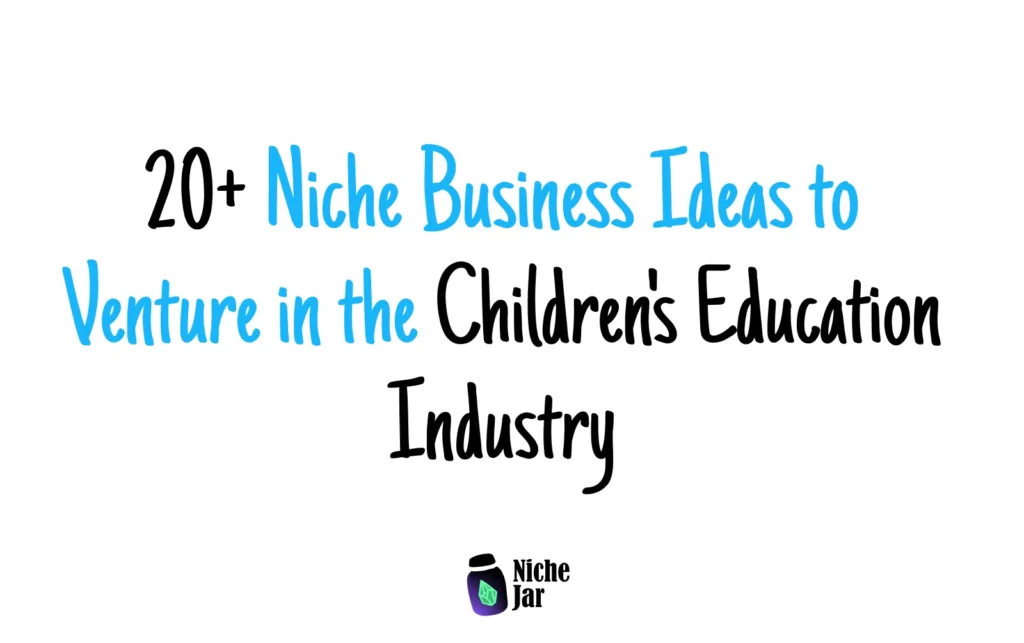
1. Online Tutoring for Specific Subjects
Online tutoring for specific subjects means offering one-on-one video sessions in areas like math or history, tailored to kids aged 8-12. This idea thrives because parents seek focused help amid busy schedules, with the edtech tutoring market growing 15% annually.
Insights: Target busy families; profitability comes from $30-50/hour rates, scalable via group sessions.
Step-by-Step Guide:
- Choose niche: Pick your strength, e.g., algebra.
- Tools: Zoom, shared whiteboard apps ($0-20/month).
- Market: Post on local Facebook groups.
- Schedule: 45-minute slots, 3x/week start.
- Scale: Record snippets for on-demand sales.
Challenges: Student engagement—solution: Use fun visuals. Startup costs: $100 (webcam). Monetization: Hourly fees, packages.
Case Study: Maria, a former teacher, tutored reading online part-time. After three months, she reached $1,200/month, adjusting based on parent feedback. If teaching feels natural, set up a free trial session.

2. Homeschool Curriculum Design
Create customizable digital curricula for homeschoolers, including lesson plans and resources for grades K-5. Appeals to growing homeschool families (up 20% post-pandemic), with high margins on $50-100 downloads.
Insights: Demand for flexible plans; target overwhelmed parents via blogs.
Practical Tips and Guide:
- Research standards: Align with common core.
- Design tools: Canva, Google Docs (free).
- Sell: Etsy or own site.
- Promote: Pinterest pins with previews.
- Update: Annual refreshes per feedback.
Challenges: Customization overload—solution: Templates with add-ons. Costs: $200 (software). Monetization: Sales, consulting upsells.
Example: Tom designed science units from home. Starting small, he hit $800/month, humbly crediting community input. This might work if planning suits you—draft one module today.
3. Educational Toy Subscription Box
Curate monthly boxes of learning toys, like puzzles for problem-solving, shipped to subscribers. Recurring model yields steady income, tapping into $10B toy ed market.
Insights: Parents love convenience; 40% retention with themed boxes.
Step-by-Step:
- Source toys: Wholesale from educational suppliers.
- Box assembly: Eco-materials ($10/box cost).
- Platform: Cratejoy ($39/month).
- Acquire subs: Instagram ads.
- Retain: Activity guides included.
Challenges: Shipping costs—solution: Regional focus. Costs: $500 (initial stock). Monetization: $25-40 subs.
Story: Lisa’s boxes for ages 4-6 grew to 150 subs ($4,500/month). She learned from early returns. Consider sourcing if toys excite—prototype a box.
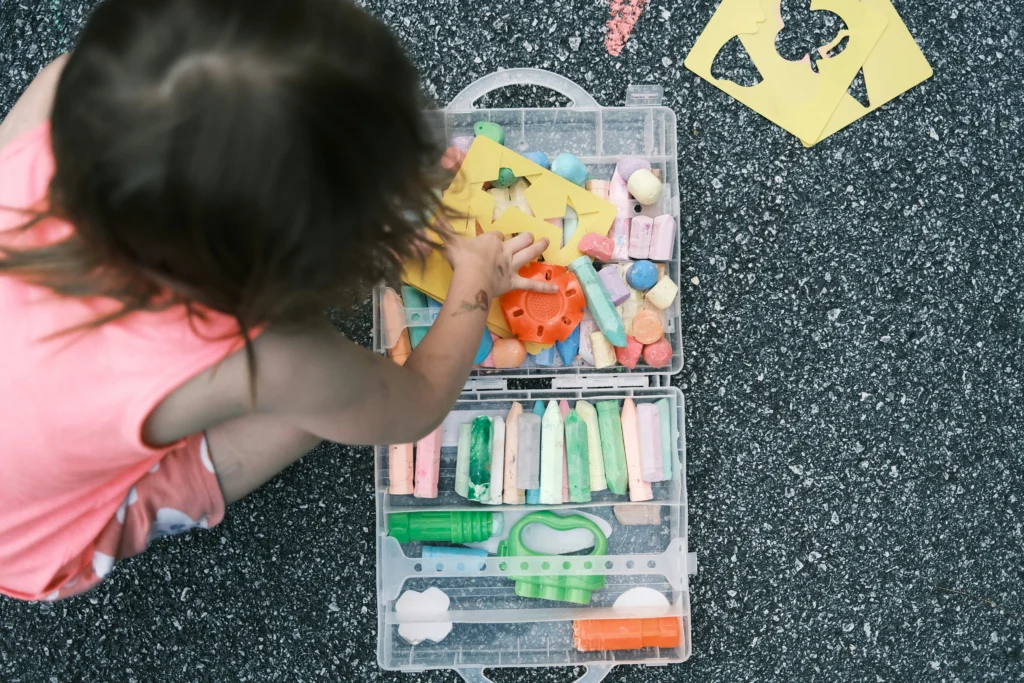
4. Children’s Language Learning Apps
Develop simple apps or partner for bilingual games, monetized via freemium models. Targets immigrant families, with language ed apps seeing 25% growth.
Insights: Mobile-first for kids; profitability from in-app purchases.
Guide:
- Idea sketch: Focus on one language pair.
- Build: No-code tools like Adalo ($50/month).
- Test: Beta with local groups.
- Launch: App stores, SEO keywords.
- Scale: Add levels based on data.
Challenges: Tech learning curve—solution: Online tutorials. Costs: $300. Monetization: Subscriptions, ads.
Case: Raj created a Spanish flashcards app. From hobby to $2,000/month downloads, user reviews guided updates. If languages call, brainstorm features.
5. STEM Kits for Home Experiments
Assemble and sell DIY kits for experiments like volcano builds, with instructions. Hands-on appeal for STEM-curious kids, market up 18%.
Insights: Parents seek screen-free fun; 60% margins.
Tips:
- Kit contents: Recycled materials where possible.
- Packaging: Sturdy, labeled ($5/kit).
- Sell: Amazon Handmade.
- Market: YouTube demos.
- Expand: Age-graded series.
Challenges: Safety—solution: Clear warnings. Costs: $400. Monetization: Direct sales.
Example: Elena’s chemistry kits sold 200/month ($1,500). Feedback refined recipes. Try an experiment if STEM sparks joy.
6. Virtual Field Trips Service
Host live-streamed tours of museums or farms for school groups. Low overhead, charging $5-10/child, as virtual ed rises.
Insights: Budget-friendly alternative; target teachers.
Step-by-Step:
- Partner venues: Email outreach.
- Tech: OBS Studio (free).
- Schedule: Weekly themes.
- Promote: Education forums.
- Record: For replay sales.
Challenges: Tech glitches—solution: Backup plans. Costs: $150. Monetization: Tickets, recordings.
Story: Greg’s history trips engaged 50 kids/session ($1,000/month). Adaptations came from trials. Book a venue if exploration fits.

7. Personalized Learning Plans
Offer bespoke plans assessing a child’s needs via quizzes, then curating resources. Consulting-style, $100-200/plan.
Insights: Rise in individualized ed; repeat business from families.
Guide:
- Assessment tool: Google Forms.
- Plan template: Editable PDFs.
- Deliver: Video walkthroughs.
- Market: Parent blogs.
- Follow-up: Monthly check-ins.
Challenges: Time-intensive—solution: Batch processing. Costs: $100. Monetization: Fees, affiliates.
Case: Sofia created plans for dyslexic kids, earning $1,800/month. Parent stories inspired tweaks. Assess a mock student to start.
8. Kids’ Coding Workshops
Run weekly online coding classes using block-based tools like Scratch. Fun for 7-12s, with coding ed demand up 30%.
Insights: Prepares for future jobs; group format scales.
Practical Tips:
- Curriculum: Free MIT resources.
- Platform: Discord or Zoom.
- Enroll: Eventbrite.
- Engage: Projects with sharing.
- Grow: Advanced tracks.
Challenges: Pace variation—solution: Tiered groups. Costs: $200. Monetization: $20/session.
Example: Alex’s workshops hit 30 kids ($1,200/month). Humble adjustments kept it fresh. Code a simple game if tech appeals.
9. Eco-Education Programs
Develop programs teaching sustainability through crafts and stories. Targets eco-aware parents, green ed growing 22%.
Insights: Aligns with school curricula; workshops or kits.
Steps:
- Content: Age-appropriate modules.
- Tools: Recycled supplies.
- Host: Local libraries or online.
- Promote: Green parenting groups.
- Scale: Digital versions.
Challenges: Material sourcing—solution: Local swaps. Costs: $300. Monetization: Fees, kits.
Story: Nina’s programs reached 100 families ($900/month). Feedback shaped themes. Plant a seed activity if nature draws you.
10. Art Therapy for Children
Facilitate sessions using drawing for emotional expression, certified lightly. Therapeutic niche, $40/session.
Insights: Mental health focus; schools refer.
Guide:
- Certify: Online basics ($100).
- Sessions: 1-hour virtual.
- Materials: Digital or mailed.
- Market: Pediatrician networks.
- Track: Progress journals.
Challenges: Emotional depth—solution: Boundaries set. Costs: $150. Monetization: Sessions.
Case: Julia’s therapy groups earned $1,100/month. Client insights guided her. Sketch a session plan.

11. Music Lessons Online
Teach instruments like ukulele via video, with sheet music. Accessible for beginners, music ed market steady.
Insights: Low barrier; $25-40/lesson.
Tips:
- Setup: Good mic ($50).
- Lessons: Structured progressions.
- Platform: TakeLessons.
- Practice: Homework videos.
- Expand: Group jams.
Challenges: Practice consistency—solution: Fun challenges. Costs: $100. Monetization: Lessons.
Example: Ben’s guitar classes grew to $1,500/month. Student wins motivated. Strum a tune to test.
12. Reading Tutoring Programs
Build phonics-based programs with books and games. Literacy focus, essential for early years.
Insights: 20% kids need extra help; packages sell well.
Step-by-Step:
- Assess: Initial reading levels.
- Tools: Apps like Epic! (affiliate).
- Sessions: Interactive reads.
- Track: Milestone reports.
- Sell: Bundles.
Challenges: Motivation dips—solution: Rewards. Costs: $200. Monetization: Programs.
Story: Carla’s tutoring boosted 40 kids ($2,000/month). Books from families helped. Read aloud if stories call.
13. Math Games Development
Create printable or app-based games for fractions fun. Digital sales, ed games up 25%.
Insights: Play-based learning; passive income.
Guide:
- Design: Canva prototypes.
- Test: Family trials.
- Sell: Teachers Pay Teachers.
- Market: Math teacher forums.
- Update: Seasonal twists.
Challenges: Engagement—solution: Themed stories. Costs: $150. Monetization: Downloads.
Case: Diego’s games sold 500/month ($750). Reviews refined. Game a math puzzle.
14. Parenting Education Workshops
Host sessions on positive discipline for parents. Supportive niche, $50/ticket.
Insights: New parents seek guidance; virtual scales.
Tips:
- Topics: Evidence-based.
- Format: 90-minute Zooms.
- Promote: Mommy blogs.
- Materials: Handouts.
- Series: Multi-week.
Challenges: Diverse needs—solution: Q&A time. Costs: $100. Monetization: Tickets.
Example: Rachel’s workshops drew 25/ session ($1,250/month). Shared experiences enriched. Outline a topic.

15. Special Needs Education Consulting
Advise on IEPs and resources for families. Expertise-driven, $75/hour.
Insights: Growing awareness; long-term clients.
Steps:
- Certify: Special ed courses.
- Consult: Home visits or calls.
- Tools: Resource databases.
- Network: Support groups.
- Document: Action plans.
Challenges: Sensitivity—solution: Empathy training. Costs: $200. Monetization: Hourly.
Story: Mark consulted for 15 families ($2,200/month). Stories humbled him. Research a need.
16. Children’s Book Creation and Sales
Write and self-publish illustrated stories on themes like kindness. Ebook/paperback, $5-15 sales.
Insights: Self-pub boom; Amazon KDP easy.
Guide:
- Story draft: 1,000 words.
- Illustrate: Fiverr ($100).
- Publish: KDP free.
- Market: Book fairs virtual.
- Series: Follow-ups.
Challenges: Marketing—solution: Reader groups. Costs: $300. Monetization: Royalties.
Case: Emma’s books sold 300/month ($900). Kid feedback sparked sequels. Write a page.
17. Educational YouTube Channel
Produce short videos on science facts for kids. Ad revenue, sponsorships.
Insights: Kid content views high; 1,000 subs monetize.
Practical Tips:
- Content: 5-min episodes.
- Edit: Free software.
- Upload: Weekly.
- SEO: Kid-friendly titles.
- Grow: Collabs.
Challenges: Algorithm—solution: Consistent themes. Costs: $200 (mic). Monetization: Ads.
Example: Leo’s channel hit 5,000 subs ($800/month). Viewer comments guided. Film a video.
18. Flashcard and Worksheet Printables
Design downloadable aids for vocabulary or spelling. Instant sales on Etsy.
Insights: Teachers buy in bulk; passive.
Step-by-Step:
- Create: Canva sets.
- Bundle: Themed packs.
- List: $5-10 each.
- Promote: Pinterest.
- Customize: Requests.
Challenges: Originality—solution: Unique twists. Costs: $50. Monetization: Sales.
Story: Tina’s printables earned $600/month. Teacher tips helped. Design a set.
(Alt text: Printable flashcards for kids – money-making digital education products)

19. After-School Program Franchising
Set up local clubs for crafts and homework help, franchise model later. Community-based.
Insights: Demand post-school; $20/child fees.
Guide:
- Venue: Community centers.
- Curriculum: Weekly plans.
- Enroll: Flyers.
- Staff: Volunteers start.
- Franchise: After proving.
Challenges: Logistics—solution: Partnerships. Costs: $1,000. Monetization: Fees.
Case: Sam’s clubs served 40 kids ($1,600/month). Parent involvement key. Plan a session.
20. Bilingual Storytime Sessions
Lead interactive readings in two languages online. Cultural bridge, $15/family.
Insights: Diverse families; repeat attendance.
Tips:
- Stories: Dual-language books.
- Engage: Props, questions.
- Host: YouTube Live.
- Schedule: Evenings.
- Record: For subs.
Challenges: Language balance—solution: Practice. Costs: $100. Monetization: Donations, subs.
Example: Ana’s sessions grew to 60 families ($900/month). Cultural shares enriched. Read bilingually.
21. Mindfulness for Kids Courses
Teach breathing exercises via animated videos. Wellness trend, $30/course.
Insights: School stress relief; digital delivery.
Steps:
- Content: 6-lesson series.
- Animate: Powtoon ($20/month).
- Sell: Udemy.
- Market: Wellness parents.
- Track: Journals.
Challenges: Kid attention—solution: Games. Costs: $150. Monetization: Courses.
Story: Zoe’s courses sold 100 ($3,000). Feedback calmed her approach. Breathe through one.
22. Science Fair Coaching
Guide kids on projects from idea to board. Seasonal, $100/project.
Insights: Annual events; portfolio builds.
Guide:
- Intake: Idea brainstorming.
- Mentor: Weekly meets.
- Tools: Supply lists.
- Present: Rehearsals.
- Network: Schools.
Challenges: Deadlines—solution: Timelines. Costs: $200. Monetization: Coaching.
Case: Victor coached 20 projects ($2,000/season). Wins taught humility. Brainstorm a project.
Here’s a comparison table for quick reference:
| Idea | Startup Cost | Profit Potential (Monthly) | Ease for Beginners |
|---|---|---|---|
| Online Tutoring | $100 | $1,000-2,000 | High |
| Printables | $50 | $500-1,000 | Very High |
| YouTube Channel | $200 | $500-1,500 | Medium |
| Subscription Box | $500 | $2,000+ | Medium |
| Consulting | $200 | $1,500-3,000 | Low |
Looking back, it’s clear how diverse and approachable these niche business ideas in the children’s education industry can be—from digital downloads that hum along in the background to heartfelt tutoring that builds real connections. What ties them together, in my view, is the chance to contribute to something bigger while carving out your own sustainable path. Success here isn’t about overnight wins; it’s the steady accumulation of small efforts, like tweaking a lesson based on a parent’s note or celebrating a child’s “aha” moment. We’re all navigating this learning curve together, and that’s what makes it worthwhile.
If one of these sparks something, give yourself permission to start small—maybe outline a simple plan or test a free session this week. Every venture begins with that first step, and it’s okay if it wobbles a bit. Swing by Nichejar.com for more inspiration in areas like profitable home-based education ideas or creative side hustles to keep the momentum going. Drop a comment below: Which idea feels like a fit for you, or what’s one challenge you’re pondering? Sharing helps us all, so pass this along if it might encourage a friend.
At its core, perseverance whispers that the most meaningful paths are the ones we walk with gentle persistence. Keep going—you’ve got this, one curious mind at a time.
TLDR
In short:
- Online Tutoring & Reading Programs: Flexible video sessions ($100 start); $1,000-2,000/month via packages, great for educators seeking work-life balance.
- Homeschool Curriculum & Printables: Digital designs on Etsy ($50-200 costs); passive $500-1,500 income, ideal for planners.
- Subscription Boxes & STEM Kits: Hands-on deliveries ($400-500); recurring $1,500-4,500, fun for crafty types.
- Workshops & Coding Classes: Group online events ($200 setup); $900-1,500/session series, scalable with themes.
- Consulting & Coaching: Personalized advice ($100-200); $1,500-3,000 hourly, leverages expertise humbly.
- YouTube & Apps: Content creation ($150-300); $500-2,000 from ads/views, builds over time.
- Books & Mindfulness Courses: Creative digital products ($150-300); $750-3,000 royalties, fulfilling for storytellers.
- Benefits: Aligns passion with profit in booming ed market; low barriers for home starts, emphasizing impact and adaptability.
